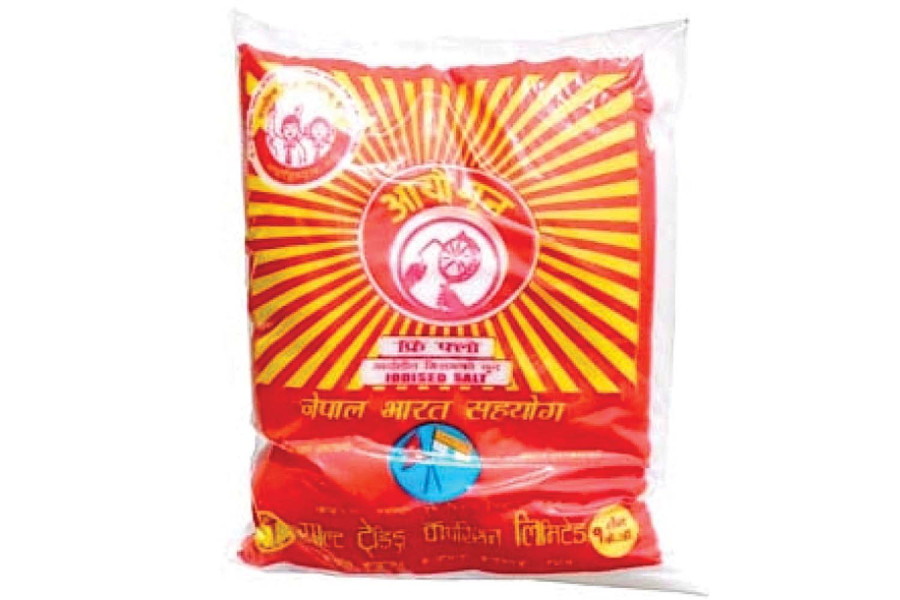National
Act on iodised salt to come into force from new fiscal
Studies show Nepalis consume excess amounts of iodine and that has resulted in a high prevalence of hyperthyroidism.
Post Report
The Act related to the production, sales and distribution of iodised salt is all set to come into force from the upcoming fiscal year as the government has decided to publish the implementation date in the national gazette.
A Cabinet meeting on Tuesday decided to implement the Iodised Salt (Production, Sale and Distribution) Act 2055 from July 17, the first day of the next fiscal year, and published the decision in the national gazette.
“Once the Act comes into effect, it will help us formulate regulations and guidelines,” said Dr Prakash Budhathoky, spokesperson for the health ministry. “This will also help in revising the upper limit of iodine level in salt, whose excessive consumption is blamed for the rise in prevalence of several non-communicable diseases.”
Iodine is a mineral found naturally in seafood and plants that grow in areas near the sea. In places such as Nepal where natural iodine is rare, it needs to be artificially introduced into the diet via fortified food products.
The Salt Trading Corporation, the agency responsible for importing and distributing salt in Nepal, fortifies iodine at 50 ppm (parts per million) per kilogram of salt, which is higher than the recommended dosage. The World Health Organisation recommends iodine concentration at 15 to 40 ppm per kg.
Only 40 ppm of iodine per kilogramme of salt is fortified for India, as it is assumed that the Indian population does not need as much iodine as the Nepali people, since they also get iodine content from foods produced near the ocean.
Officials said the higher iodine level was mandated for Nepal under the assumption that the mineral would dissipate by the time salt purchased in India reached markets in Nepal, especially those in the remote parts of the country, at a time when the kitchen essential had to be carried on the backs of men and animals.
However, with roads reaching almost all corners of the country, transportation time has now significantly decreased, so there is no need for such a high level of iodine in salt, say doctors.
WHO recommends less than two grams of sodium or five grams of salt per day for adults to reduce blood pressure, and cut the risks of cardiovascular diseases and stroke.
Health experts in Nepal have blamed the excessive amounts of iodine content in salt for the rise in non-communicable diseases, including thyroid disorders and hypertension.
A change in dietary patterns and an increased consumption of processed foods (including packaged soups) have resulted in an increased prevalence of non-communicable diseases such as hypertension and cardiovascular diseases, they added.
Several studies—including the 2016 Nepal National Micronutrient Status Survey jointly carried out by the WHO, UNICEF, the US-based Centres for Disease Control and Prevention, and the Ministry of Health and Population—found that Nepalis consume excessive amounts of iodine, which has resulted in high prevalence of hyperthyroidism, a condition when the thyroid gland does not produce enough thyroid hormones.
The survey showed that more than two-thirds of the population—68 percent—across the country is consuming iodine far in excess of the recommended levels.
According to the Non-communicable Disease Risk Factors: Steps Survey-2019, 5.6 percent of the adults (6.5 percent of women and 4.6 percent of men) reported adding salt often or always to food right before or while eating.
Additionally, 19.5 percent of the adults (18.1 percent of the women and 21.1 percent of men) reported consuming processed foods that are often or always high in salt.
Earlier, the government had sent a team of experts to salt factories in India’s Gujarat state to study the iodine fortification process and the possibility of lowering the iodine content in salt. The expert team furnished its report, but the authorities concerned could not decide on the reduction of iodine level in salt.
In 1993, Nepal mandated that salt be fortified with iodine to prevent health problems caused by iodine deficiency, as salt is both cheap and used round the year.
Health officials say the Act, formulated in 1999, was published in the national gazette in 2007, but the implementation date was not mentioned in the national gazette then.
“The Cabinet decision to publish the date of enforcement of the Act in the national gazette will help in the formulation of relevant regulations and guidelines, which will also help in taking decision to set new upper limit of iodine content in salt,” said Lila Bikram Thapa, chief of Nutrition Section at the Family Welfare Division under the Department of Health Services.
“Setting the upper limit of iodine content in salt is the responsibility of the Ministry of Agriculture and Livestock Development.”




 14.12°C Kathmandu
14.12°C Kathmandu













